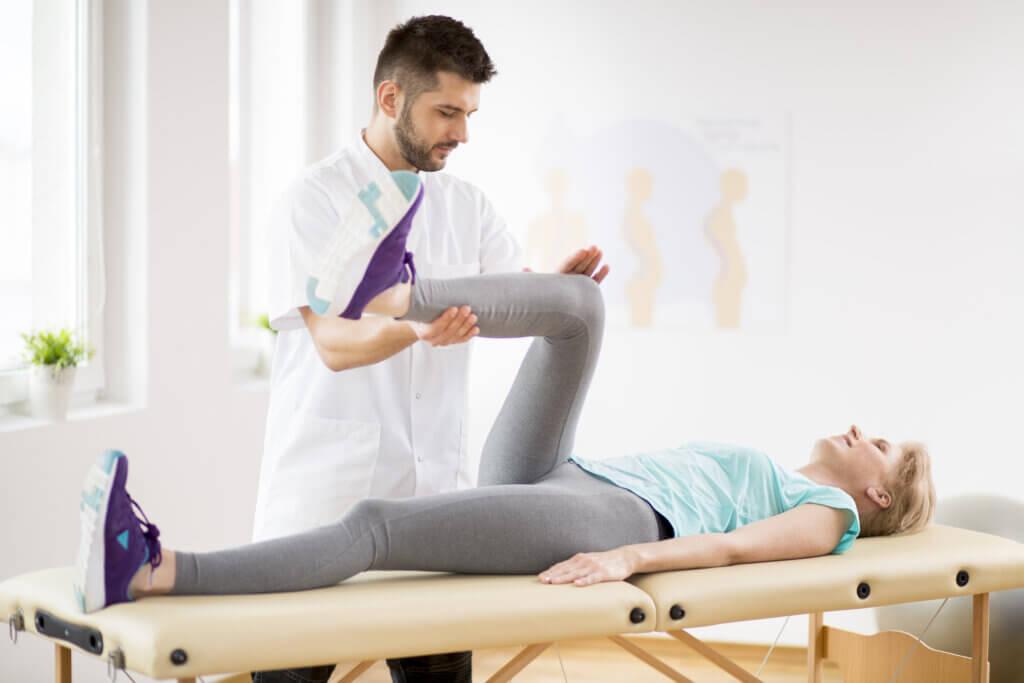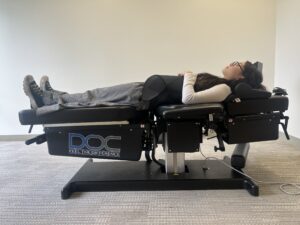Knee pain can stop you in your tracks, making everyday tasks feel impossible and unbearable. Loss of mobility leads to loss of enjoyment of life, and often depression. It puts a damper on everything from spending time with loved ones to trying to do the laundry. A knee pain doctor can help!
But choosing a knee pain doctor near me is an important first step to finding relief. But if you’ve Googled knee pain doctor near me and feel overwhelmed, you’re not alone.
That’s precisely why I decided to create the knee doctor guide. Read on to learn how doctors treat knee pain in San Francisco. What doctor checks knee pain of unknown knee pain causes? And how to get on the fastest track to pain relief and restore function, so you can get back to living the active lifestyle you want.

What Causes Knee Pain?
At TruSpine, we believe in identifying and addressing the underlying reasons for your discomfort to create a tailored treatment plan. Here are some of those potential causes, each of which may require a different type of knee pain doctor.
Injuries
Knee injuries are among the most common causes of severe pain. These can result from accidents, sports, or overuse. Common injury-related conditions include:
- Ligament Tears: Injuries to the ACL, MCL, or PCL can cause instability and sharp pain.
- Meniscus Tears: Damage to the knee’s cartilage can lead to swelling, stiffness, and difficulty moving.
- Tendon Injuries: Overuse or strain can inflame tendons, causing conditions like tendinitis.
Arthritis
Arthritis is a leading cause of chronic knee pain. It occurs when the joint’s protective cartilage wears down or becomes inflamed. The most common types affecting the knee are:
- Osteoarthritis: Caused by wear and tear, leading to stiffness and reduced mobility.
- Rheumatoid Arthritis: An autoimmune condition that inflames the joint lining.
- Post-Traumatic Arthritis: Develops after an injury, even years later.
While arthritis can be a degenerative chronic condition, it’s also important to note that factors like lifestyle, diet, and yes, carrying extra weight can all make it worse and help it progress faster. Even those with substantial knee damage can stop and reverse the damage.
Some knee pain doctors believe this damage is irreversible—and a life sentence of harsh pain medicine. But others know your knees can heal themselves, substantially reducing pain and restoring mobility. As you explore knee pain doctors near me, it’s important to consider which one you’d rather work with.
Overuse and Repetitive Stress
Repetitive motions or prolonged activity can lead to overuse injuries, especially in athletes and active individuals. Common overuse conditions include:
- Patellar Tendinitis: Also known as “jumper’s knee,” it is caused by stress on the tendon connecting the kneecap to the shinbone.
- Runner’s Knee: Pain around the kneecap from improper tracking or overuse.
Muscle Imbalances
Weak or tight muscles around the knee can create uneven pressure on the joint.
This imbalance can cause pain and increase the risk of injury. Common culprits include:
- Weak quadriceps or hamstrings
- Tight hip flexors or calves
Obesity
Excess weight places additional strain on your knees. Over time, this can accelerate cartilage breakdown and lead to chronic pain or arthritis. Whether you have weight loss goals or not, a knee pain doctor will support your goals to reduce knee pain. But if you are carrying significant extra weight (muscle or fat), losing some weight can certainly help.
According to the Johns Hopkins Arthritis Center, when you walk, you place roughly 1.5X your weight across your knees. Running puts 4X the weight on the knees. Going upstairs adds 2-3X the weight. Squatting adds 4-5X your body weight. So, someone who weighs 200 lb could potentially put 800+ lbs of weight on their knees. Ouch!
Structural Issues
Sometimes, knee pain arises from the way your body is built or moves. Examples include:
- Flat Feet or Overpronation: Can alter your gait and put extra stress on your knees.
- Misalignments: Spinal or pelvic imbalances can transfer stress to the knees, leading to discomfort.
This may result in medial knee pain (inner knee), lateral knee pain (outside of the knee), or general discomfort when walking or going up and down stairs.
Aging
As you age, your joints naturally lose strength and flexibility. Cartilage thins, and recovery slows, making you more susceptible to knee pain. With that said, your lifestyle and how you care for your knees can significantly impact how your knees develop as you age. You can have healthy knees well into your 90s and beyond. If you’re interested in having the freedom to move without pain as you age, this is definitely something to discuss with your knee pain doctor.

A Knee Pain Doctor Is Called What?
When knee pain strikes, you might wonder, “A knee pain doctor is called what?” The answer isn’t always straightforward. Some knee pain doctors specialize in knee pain prevention or recovery from sports injuries. Others work more with people with wear and tear-related issues like lost cartilage.
Yet others perform knee surgeries, while yet another type of knee pain doctor’s primary role is managing the pain with medications—some with some miserable side effects.
A lot of the confusion comes from the fact that many people with knee pain don’t know what’s causing it. If they don’t know what kind of treatment they might need, how can they choose? I will provide you with a simple answer. But first, let’s look at what each type of knee pain doctor does.
Knee Pain: What Doctor to See?
Several types of doctors can diagnose and treat knee pain. Each takes a varied approach and set of skills. They also often have different philosophies for managing knee pain. Depending on the cause and severity of your knee pain, you may need to work with one or more of these knee pain specialists.
Orthopedists / Orthopedic Surgeons
- Role: This is a knee pain doctor who specializes in the bone and joints, including the knee.
- Expertise: They perform comprehensive diagnostic exams on the knee and may recommend interventions such as weight loss, low-impact exercise, chiropractic care, ultrasound therapy, surgery, pain medicine, anti-inflammatory medications, and steroids to promote faster healing.
- What They Treat: The knee pain they treat is often severe and may result from a serious injury like a torn ACL (anterior cruciate ligament) or severe bodily misalignment. Those with wear and tear injuries or cartilage reduction might also go to see them, hoping for some relief. In this case, the orthopedist may recommend something drastic like a knee replacement or a cartilage replacement surgery. But this isn’t the best place to start your journey to knee pain relief. And many patients find themselves caught in a whirlwind, barreling toward this expensive, painful, and life-disrupting surgery. There are better options.
- Their Philosophy: I can’t speak for all orthopedists. Some will try less invasive treatments first to see if you get adequate relief. Many of these only mask symptoms and don’t actually promote knee healing—which is possible and can provide a lifetime of relief. Other orthopedists may tell you that surgery is your only option.

Knee Pain Doctor Chiropractor
- Role: Chiropractors specialize in bone and joint health and can help alleviate pain through adjustments, therapy, and personalized care. They aim to restore your mobility without relying on surgery or medications long-term. They focus on how the whole musculoskeletal system impacts the knees, providing non-invasive treatments that address the root cause of your discomfort.
- Expertise: A chiropractic knee pain doctor can also perform a comprehensive exam, including advanced imaging like MRI or CT, to ensure they fully understand the cause of your knee pain.
- What They Treat: They can treat knee pain resulting from an injury, post-surgery, wear-and-tear, arthritis, aging, musculoskeletal misalignments, and cartilage loss. Based on your needs, they can personalize a treatment to address the root cause of the knee pain. Sometimes, the root cause is a serious injury that does require surgical intervention. But more often than not, less-invasive treatments can promote natural healing and eliminate the pain—in less time than you think. Chiropractors use innovative and proven treatments to support the human body’s natural ability to heal itself. These might include chiropractic adjustments, knee strengthening exercises, nutrition, tissue-stimulating ultrasound therapy, Graston Technique, and Knee on Trac. Keep reading: Graston Technique for Pain Relief
- Their Philosophy: A chiropractor is a functional medicine specialist who knows that many conditions that modern medicine treats with medication and surgery can be treated by helping the body heal itself. For example, misalignments in the spine can lead to an imbalance when standing and walking. This puts added pressure on the knees with every movement and can cause uneven wear and tear. By restoring alignment and stimulating your knee’s natural ability to regenerate, a chiropractor can turn what an orthopedist may think of as a chronic, irreversible condition into one very healthy set of knees.
You can Schedule a knee pain assessment and get your first Knee on Trac treatment the same day if your diagnosis calls for it.
Pain Management Knee Pain Doctor
- Role: This specialist specifically supports people who have acute or chronic pain. Their job is to prescribe medications to keep a patient comfortable while striking a balance with the ability to function in daily life. This is easier said than done! Many pain medications impact reaction time, memory, mood, and cognition in negative ways. And some can worsen a condition when taken long term.
- Expertise: They may prescribe medications that a patient will continue to take for the rest of their life. Because pain medications lose effectiveness over time, they must continually adjust the dose and try to find new combinations to provide relief.
- What They Treat: They work with patients living with debilitating pain from an injury or illness that may not be treatable or reversible.
- Their Philosophy: The general way of thinking for a pain management doctor is: Let’s keep the patient comfortable since there’s not much more we can do for them.
which doctor for knee pain: A Multi-disciplinary Approach
What doctor treats knee pain? Which doctor specializes in knees? The answer: Each of these doctors does.
They have different philosophies and sets of skills. If you have miserable knee pain, you may need to see more than one doctor. Chiropractors, Orthopedists, and Pain Management Doctors often work together to support your healing journey—each using their strengths to address your unique needs.
For example, in the case of a torn ACL, an orthopedic surgeon may perform surgery before referring the patient to a chiropractor for ongoing knee strengthening to promote proper healing. After knee surgery, it’s critical to get the knee moving as quickly as possible so that it heals correctly. Scheduling regular visits with your chiropractor can also ensure the knee stays aligned and strong—preventing re-injury or other sports injuries.
During this time, you may also need to take medications for a time. As the knee recovers, your pain management doctor can wean you off the medication until you’re healthy and drug-free.
So, where do you start?
which doctor to consult: Who to See First
If you prefer a natural, drug-free approach, a chiropractor might be your best choice. Regardless of what you think caused your knee pain, starting here ensures you don’t find yourself ushered off toward surgery or a lifetime of pain meds if a less-invasive option would have done the job.
As a chiropractor, I can order the same imaging tests an orthopedist would. I can assess the cause of your knee pain. I can develop a knee pain treatment plan to treat the root cause while helping you get knee pain relief fast.
If you have significant tissue damage beyond my scope of practice, I will refer you to an orthopedist. But by starting here, you work with a knee pain doctor who knows that, in most cases, your body can heal itself with the right care—and without surgery or strong pain medicine.
How Chiropractors Treat Knee Pain: Treatments and Therapies
Chiropractors specialize in the musculoskeletal system and offer non-invasive, drug-free treatments that address the root causes of discomfort. At Truspine, we utilize a variety of innovative therapies to relieve knee pain and restore mobility. Depending on the cause and severity of your knee problems, as your knee pain doctor, we might recommend one or more of these well-established treatments for knee pain.
Chiropractic Adjustments
Chiropractic adjustments focus on realigning the spine and joints to reduce pressure on the nerves and joints and improve overall function. Misalignments can cause improper movement patterns, leading to irregular wear patterns on the joint, resulting in knee pain.
By correcting these issues, we help your body heal naturally and prevent future injuries. Our chiropractors not only adjust your spine. We also show you safer and more aligned ways to move, lift, and do your daily activities to support knee health. Our goal is to teach you how to move better and feel your best so that an occasional chiropractic adjustment is all you need to stay aligned and do what you love.
Knee on Trac Therapy
Our Knee on Trac therapy provides gentle, effective knee decompression. This treatment increases joint space, reduces inflammation, and promotes the healing of damaged tissues. It’s particularly beneficial for conditions like osteoarthritis, meniscus tears, and chronic knee pain.
Knee on Trac is clinically proven to increase cartilage thickness in patients with degenerative knee conditions like arthritis. The researchers additionally found that patients who received the Knee on Trac Therapy showed reduced pain, increased physical function, and lower rates of depression associated with their condition.
Download our Knee on Trac brochure to learn more about this non-invasive answer to knee pain.
Graston Technique
The Graston Technique is an evidence-based form of instrument-assisted soft tissue mobilization. Using specialized tools, we break down scar tissue and fascial restrictions in the knee area. This process enhances blood flow, reduces pain, and accelerates recovery.
Graston technique is an important knee pain treatment option in the right hands. Your Graston-trained chiropractor targets adhesions with a special device very precisely. But Graston tools can be dangerous in the wrong hands, leading to extensive tissue damage, often permanent. Do not try this at home or let just anyone attempt this procedure on you.
Shockwave Therapy
Also known as Myofascial Acoustic Compression Therapy (MyACT), this non-invasive treatment utilizes acoustic waves to target deep tissues within the knee. The Piezowave® Shockwave Therapy system delivers focused sound waves that pass painlessly through the body, converging on affected areas to stimulate healing.
This therapy works by increasing circulation, reducing local muscle tension, and promoting the production of collagen—all key components in the healing process. It’s particularly effective for conditions like patellar tendonitis, arthritis, and other chronic knee issues. Sessions are relatively quick, typically lasting between 7 to 10 minutes, and most patients experience significant improvements after a series of treatments without the need for medication or anesthesia.
Ultrasound Therapy
Ultrasound therapy uses high-frequency sound waves to stimulate tissues beneath the skin’s surface. This treatment improves circulation, decreases swelling, and alleviates pain. It’s a painless, non-invasive option that supports your body’s natural healing processes.
Nutritional Counseling
Nutrition plays a vital role in joint health. Our chiropractors provide personalized nutritional guidance to support tissue repair and reduce inflammation. We may recommend dietary changes or supplements to enhance your overall well-being.
Customized Exercise Programs
Strengthening the muscles around your knee can provide stability while also reducing pain, inflammation, and further damage. We develop individualized exercise plans focusing on improving flexibility, balance, and strength. These exercises are easy to perform at home and are essential for long-term knee health.
Acupuncture
As part of our holistic approach, acupuncture may be incorporated to relieve knee pain. This ancient practice stimulates specific points on the body to balance energy flow, reduce discomfort, and promote healing.
How Long Should Knee Pain Last Before Seeing a Doctor?
You might think knee pain will just go away. But how long should knee pain last before seeing a doctor? If your pain persists for more than a week or hinders your daily activities, it’s time to seek professional help. Sudden, intense pain, particularly after a known injury, should be assessed immediately.
Early intervention can prevent further damage and get you back to enjoying life sooner.
When to See a Knee Pain Specialist
Knee pain should never be ignored, especially if:
- It persists for more than a week.
- Swelling, redness, or warmth develops.
- Pain interferes with daily activities.
- You experience instability or “locking” of the knee.
- You experienced a known sports injury such as a dislocation or sudden pain with or without loss of mobility.
Schedule your initial consultation and first Knee on Trac to start experiencing the joy of living pain-free.
How to Find a knee pain specialist near me
Truspine Chiropractors are knee pain specialists. We assess the root cause of knee pain, develop effective treatment plans, and work with other knee pain doctors to ensure you get the care you need. At Truspine, we believe in treating the whole person, not just the symptoms. Our integrated therapies aim to address the underlying causes of your knee pain, providing lasting relief and improved mobility. We’re dedicated to helping you return to the activities you love, free from discomfort.
“Help! I have knee pain but doctor says nothing’s wrong”
First, know that we believe you. Knee pain can begin long before damage is detected on MRI, which may lead some knee pain doctors to think you’re exaggerating how bad it hurts. And we’ll be honest. It’s good that you’re so aware that something isn’t right. Addressing this early can mean stopping the damage before it becomes visible on MRI.
Just because we can’t see the problem on a test, doesn’t mean your pain isn’t real. And because you’ve caught it early, you probably have the type of knee pain that is easily reversed when we get to the root cause of that pain.
It could be the way you’re standing or walking at work or a particular exercise you’re performing at the gym. You could have a herniated disc leading to misalignment down the kinetic chain—neck to ankle. Even something as seemingly innocent as sitting too much can lead to weak knees that begin to ache.
We’ll take time to figure out what’s causing your pain. We listen. And we look beyond the usual suspects. If you’re having knee pain, we believe you.

Experience True Relief at Truspine
Imagine moving freely without that nagging knee pain. Our team is here to help you achieve that. With innovative treatments and compassionate care, we focus on unlocking your body’s natural ability to heal.
Don’t let unexplained knee pain hold you back. Contact Truspine Chiropractic and discover how our personalized knee pain care can make a real difference in your life. You deserve to live pain-free. Schedule a full evaluation with your first Knee on Trac treatment.
Frequently Asked Questions About Knee Pain Doctors
What are the common causes of knee pain?
Knee pain can result from various factors, including injuries (like ligament tears or meniscus damage), arthritis (such as osteoarthritis or rheumatoid arthritis), overuse, muscle imbalances, obesity, structural issues, and the natural aging process.
What type of doctor should I see for knee pain?
Several specialists can help with knee pain, including chiropractors, orthopedists, and pain management doctors. If you prefer a natural, non-invasive approach, starting with a chiropractor can be beneficial. They focus on addressing the root cause of pain through adjustments, therapy, and personalized care. And many people who’ve been told that knee surgery is their only option may want to get a second option from a knee doctor who understands how the knee can heal itself with the right support.
How can a chiropractor help with knee pain?
Chiropractors specialize in the musculoskeletal system and can alleviate knee pain by correcting misalignments, improving joint function, and enhancing mobility. They use various treatments like chiropractic adjustments, Knee on Trac therapy, and customized exercise programs to address the underlying issues causing pain.
What is Knee on Trac therapy?
Knee on Trac is a non-invasive therapy that provides gentle knee decompression. It increases joint space, reduces inflammation, and promotes healing of damaged tissues. This therapy is particularly effective for conditions like osteoarthritis, meniscus tears, and chronic knee pain. It has been shown to help people regrow cartilage.
What is the Graston Technique?
The Graston Technique is an evidence-based form of instrument-assisted soft tissue mobilization. Chiropractors use specialized tools to break down scar tissue and fascial restrictions around the knee, enhancing blood flow, reducing pain, and accelerating recovery.
How does Shockwave Therapy relieve knee pain?
Shockwave Therapy, or Myofascial Acoustic Compression Therapy (MyACT), utilizes acoustic waves to target deep tissues within the knee. It increases circulation, reduces muscle tension, and stimulates collagen production, aiding in the healing process for conditions like patellar tendonitis and arthritis. As an aside, collagen is a critical structural protein the body uses to regrow cartilage and strengthen bone and joint tissues.
When should I see a doctor for knee pain?
If knee pain persists for more than a week, interferes with daily activities, or is accompanied by swelling, redness, or instability, it’s important to seek professional help promptly to prevent further damage.
Can chiropractors help with arthritis-related knee pain?
Yes, chiropractors can help manage arthritis-related knee pain by improving joint function, reducing inflammation, and enhancing mobility through non-invasive treatments tailored to your specific condition.
What if my doctor says nothing is wrong, but I still have knee pain?
If you’re experiencing pain without a clear diagnosis, a chiropractor can provide a different perspective. They specialize in identifying subtle misalignments and functional issues that might not show up on standard medical tests, offering personalized treatments to address your pain.
How does obesity contribute to knee pain?
Excess weight places additional strain on your knees, accelerating cartilage breakdown and increasing the risk of chronic pain or arthritis. Managing weight through diet, exercise, or —as a last resort—injections or surgery can alleviate pressure on the knees and reduce pain.
Are there natural treatments for knee pain?
Yes, natural treatments include chiropractic care, physical therapy, nutritional counseling, customized exercise programs, acupuncture, and lifestyle modifications aimed at reducing pain and promoting healing without medications or surgery.
What is the difference between an orthopedist and a chiropractor for knee pain?
An orthopedist specializes in the skeletal system and may recommend surgery or medications for knee issues. A chiropractor focuses on the musculoskeletal system’s alignment and function, offering non-invasive treatments to address the root cause of knee pain.
How can I find a knee pain specialist near me?
You can search for local chiropractors or knee pain clinics specializing in non-invasive treatments. Truspine Chiropractic in San Francisco offers personalized care and innovative therapies for knee pain relief.
Can knee pain be reversed, or is it permanent?
Many causes of knee pain can be effectively managed or even reversed, especially when addressed early. Treatments focusing on healing and strengthening can restore function and reduce or eliminate pain.
What can I expect during a chiropractic visit for knee pain?
During your visit, the chiropractor will perform a thorough assessment, which may include a physical examination, reviewing your medical history, and ordering imaging. They will develop a personalized treatment plan that may involve adjustments, therapies, and recommendations for exercises or lifestyle changes.
Is chiropractic treatment safe for knee pain?
Yes, chiropractic treatment is generally safe and non-invasive. Chiropractors are trained professionals who use precise techniques to improve joint function and alleviate pain. They tailor treatments to each patient’s needs to ensure safety and effectiveness.
Do I need a referral to see a chiropractor for knee pain?
In most cases, you do not need a referral to see a chiropractor. You can directly schedule an appointment to address your knee pain concerns.
How can muscle imbalances cause knee pain?
Muscle imbalances occur when some muscles are stronger or tighter than others, leading to uneven pressure on the knee joint. This can cause pain and increase the risk of injury. Addressing these imbalances through targeted exercises can alleviate pain.
Can aging lead to knee pain, and how can it be managed?
Aging can lead to natural wear and tear of the knee joint, causing pain. However, proactive care like regular chiropractic treatments, exercise, and healthy lifestyle choices can manage symptoms and maintain knee function.
What lifestyle changes can help reduce knee pain?
Lifestyle changes such as maintaining a healthy weight, engaging in low-impact exercises, improving posture, wearing supportive footwear, and following a balanced diet can significantly reduce knee pain and improve joint health.
You deserve to live pain-free. Schedule a full evaluation with your first Knee on Trac treatment.




